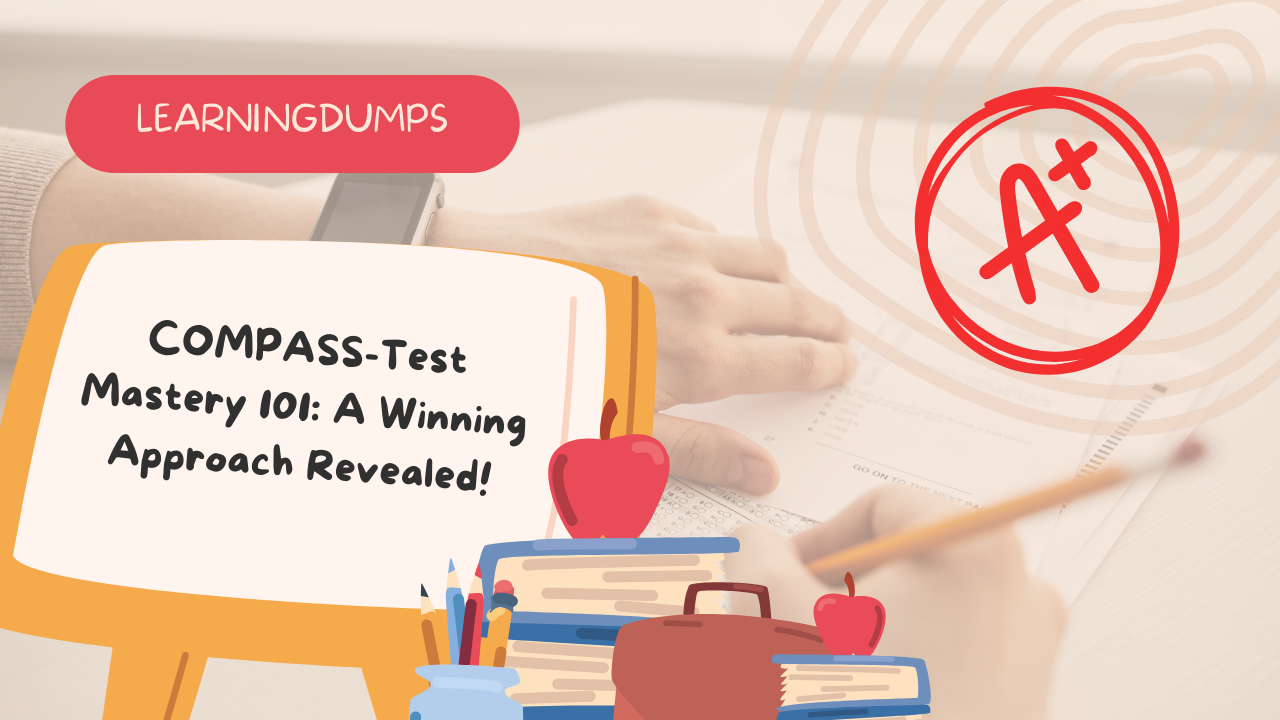Are you ready to conquer the COMPASS Test and take your academic journey to new heights? Well, you’ve come to the right place! Welcome to COMPASS-Test Mastery 101: A Winning Approach Revealed!
COMPASS-Test Mastery 101:
In this blog post, we will unlock the secrets of mastering the COMPASS-Test exam and provide you with invaluable tips and strategies that can skyrocket your scores. Whether you’re a high school student preparing for college or an adult learner seeking placement in higher education, this article is your ultimate guide to success.
So, fasten your seatbelts, because it’s time to set sail on a journey towards test mastery like never before!
Understanding the Format of the Test
The COMPASS test is a standardized exam designed to assess students’ readiness for college-level courses. Before diving into test preparation, it’s crucial to have a solid understanding of its format.
The COMPASS test consists of multiple-choice questions that cover various subjects such as reading, writing, and math. Each section focuses on specific skills and knowledge areas necessary for success in college.
In the reading section, you’ll encounter passages followed by questions that assess your comprehension and analysis skills. It tests your ability to understand the main ideas, draw conclusions, identify supporting details, and recognize the author’s tone or purpose.

The writing section evaluates your writing abilities through prompts that require you to develop an essay response. You will be assessed on organization, clarity of ideas, grammar usage, sentence structure, and vocabulary proficiency.
The math section measures your quantitative reasoning skills. You’ll face problems covering topics like algebraic operations, geometry concepts, and data interpretation.
To succeed in this section, strong problem-solving strategies and mathematical fluency are essential. By familiarizing yourself with the format of the COMPASS-Test, you can better tailor your study plan to focus on improving specific areas. Knowing what each section entails allows you to allocate sufficient time for practice and ensures you’re well-prepared come test day.
So roll up those sleeves, dive into studying with confidence, and conquer the COMPASS Test!
Importance of Preparing for the Test
Preparing for any test is crucial, and the COMPASS Test is no exception. Whether you’re a high school student hoping to get into college or an adult looking to further your education, taking the time to prepare can make all the difference in achieving a high score.
One of the main reasons why preparation is so important is that it allows you to familiarize yourself with the format and content of the COMPASS test. By understanding what to expect on exam day, you can alleviate anxiety and perform at your best. Additionally, preparing for this test enables you to identify areas where you may need extra practice or support.
Another reason why preparation is vital is that it helps build confidence. When you’ve put in the effort beforehand, completing practice questions and learning key concepts, you’ll feel more self-assured when facing each section of the COMPASS-Test. Confidence plays a significant role in performance – if we believe in ourselves, we are more likely to succeed.
Moreover, preparing for this test allows us to develop effective strategies for tackling different types of questions and managing our time efficiently during each section. By practicing these strategies beforehand, they become second nature on exam day which significantly improves our chances of scoring higher.
Last but certainly not least (if that’s even a word), preparing demonstrates dedication and commitment towards achieving your goals – whether it be getting accepted into your dream college or advancing in your career path. It shows potential educational institutions or employers that you are motivated and willing to put in the hard work necessary for success.
In conclusion (oops!), don’t underestimate how important it is to prepare thoroughly before taking the COMPASS-Test Exam! Investing time and effort into studying will pay off immensely when it comes time for those results – trust me! You got this!
Tips and Strategies for Mastering the COMPASS-Test
Are you feeling nervous about taking the COMPASS Test? Don’t worry, we’ve got you covered! In this section, we will share some valuable tips and strategies to help you master the exam with confidence.
It’s crucial to familiarize yourself with the format of the test. The COMPASS Test typically includes sections on reading comprehension, writing skills, math, and essay writing. Take some time to understand what each section entails and what specific skills they assess.
Next, make a study plan that suits your learning style. Some people prefer studying alone in a quiet environment while others thrive in group settings or with background music. Experiment with different techniques and find what works best for you.
Practice is key when it comes to mastering any exam. Make use of online practice tests or study guides specifically designed for the COMPASS Test. These resources can give you an idea of the types of questions asked and help you identify areas where you need improvement.
When tackling multiple-choice questions in the reading comprehension or math sections, read through all options before selecting your answer. This way, even if one option seems correct at first glance, there may be a better choice among the alternatives.
In writing tasks like essays or short responses, take a few minutes to brainstorm ideas before diving into writing. Create an outline that organizes your thoughts logically and helps maintain coherence throughout your response.
Last – but certainly not least – manage your time effectively during the test. Pace yourself so that you have enough time to complete each section without rushing through questions or leaving them unanswered.
By implementing these tips and strategies into your preparation routine for the COMPASS-Test exam, you’ll be well-equipped to tackle any challenge that comes your way! Good luck!
Practice Makes Perfect: Recommended Resources for Preparation
When it comes to preparing for the COMPASS Test, practice truly does make perfect. The more you expose yourself to the format and content of the exam, the better equipped you will be to tackle it with confidence. Thankfully, there are a variety of resources available that can help you on your journey to mastery.
One highly recommended resource is online practice tests specifically designed for the COMPASS test. These tests simulate the actual exam experience and allow you to familiarize yourself with its structure and question types. By practicing under timed conditions, you can improve your time management skills and learn how to efficiently navigate through each section.
Another valuable tool is study guides that provide comprehensive coverage of all topics tested in the COMPASS-Test. These guides break down key concepts into easily digestible explanations and offer practice questions along the way. They serve as a roadmap for your preparation journey, ensuring that no important topic is left unaddressed.
Additionally, consider seeking out tutoring or enrolling in test prep courses tailored specifically for the COMPASS test. Experienced instructors can guide you through challenging sections, provide personalized feedback on your performance, and offer strategies for maximizing your score potential.
Don’t underestimate the power of utilizing free online resources such as Khan Academy or educational YouTube channels dedicated to helping students prepare for standardized exams like COMPASS-Test. These platforms often provide video lessons and interactive exercises that reinforce key concepts covered in the exam.
Remember, success on any exam requires dedication and consistent effort. By incorporating these recommended resources into your study routine, you’ll be well-prepared when test day arrives!
Success Stories: Real-Life Examples of Students Who Improved Their Scores
Let’s dive into some inspiring success stories from real students who were able to significantly improve their scores on the COMPASS Test. These individuals prove that with dedication, hard work, and the right strategies, anyone can achieve great results.
Meet Sarah, a high school senior who struggled with math throughout her academic journey. When she first took the COMPASS Test, her math score was below average. However, instead of being discouraged, she decided to take control of her learning.
Sarah enrolled in a comprehensive math review course and spent countless hours practicing problems and seeking clarification when needed. Through consistent effort and determination, Sarah saw remarkable progress in her scores. She not only improved her math score but also excelled in other sections of the test.

Another success story is John, an adult learner who had been out of school for many years before deciding to pursue higher education. With limited time available due to work commitments and family responsibilities, John knew he had to make every study session count.
He utilized online resources specifically designed for COMPASS-Test preparation and developed a study schedule that fit his busy lifestyle. By setting aside dedicated time each day to focus on his goals and utilizing effective study techniques like flashcards and practice tests, John was able to see significant improvement across all sections of the test.
These success stories highlight two key factors necessary for achieving high scores on the COMPASS-Test: commitment and tailored preparation methods aligned with individual needs.
By sharing these examples, we hope to inspire you as you embark on your journey towards mastering this exam! Remember that everyone’s path may differ slightly; what works for one person may not work the same way for another individual.
Stay motivated by celebrating small victories along the way – whether it’s mastering a difficult concept or seeing gradual improvements in your practice tests. Embrace challenges as opportunities for growth rather than setbacks.
In the next section, we will explore some essential tips and strategies that can help you succeed on the COMPASS Test and achieve your desired scores.
Conclusion: The Power of Preparation and Dedication in Achieving High Scores on the COMPASS-Test
In this article, we have delved into the world of the COMPASS test and explored various aspects of it. From understanding its format to discussing the importance of preparation, we have covered a lot. But now, let’s take a moment to appreciate the power of preparation and dedication when it comes to achieving high scores on this test.
Preparing for any exam is not just about studying hard; it’s about having a strategic approach that maximizes your chances of success. And when it comes to the COMPASS-Test, this holds as well.
By understanding the format and content of the test, you can identify your strengths and weaknesses. This knowledge allows you to focus your efforts on areas that need improvement while also capitalizing on your existing skills. It’s like creating a personalized roadmap for success!
Equipped with this knowledge, you can then implement effective tips and strategies specifically tailored for mastering the COMPASS Test. Whether it’s managing time effectively during each section or utilizing smart guessing techniques, these small but impactful strategies can make all the difference in boosting your overall score.
But let’s not forget one crucial aspect – practice! Practice truly makes perfect when it comes to preparing for any exam, including the COMPASS Test. With so many resources available online today, there are ample opportunities for mock tests, sample question sets, and comprehensive study guides designed specifically for this test.
By dedicating yourself to regular practice sessions using these recommended resources, you’ll become more familiar with both testing conditions and question types. This familiarity breeds confidence which ultimately leads to higher scores!
Now imagine real-life students who applied these principles diligently – their stories serve as inspiration because they prove that success is attainable through careful preparation combined with unwavering dedication.
These students recognized that achieving high scores on the COMPASS Test required effort beyond just attending classes or reviewing materials. They went the extra mile, putting in extra hours of practice, and fine-tuning their skills. And their efforts paid off with scores that not only impressed them but also opened doors to better opportunities.